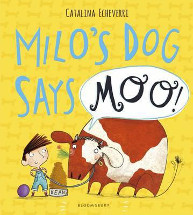Milo's dog says moo! by Catalina Echeverri

Bloomsbury, 2015. ISBN 9781408838808
(Age: Junior primary) Recommended. Animals. Friendship. Milo has
wanted a dog for so long that when his birthday comes around he is
allowed to choose one for himself. His parents are unsure of his
selection, but Milo is deliriously happy and calls his dog, Beans.
But Beans is unlike other dogs. He prefers Mum's indoor plants to
the bowl of dog food, he enjoys eating the garden plants, and when
Milo comes to train him, he does not seem in the least trainable. He
doesn't chew on bones, or chase a ball, and is definitely not
feeling very doggy about cats. All the while the wonderful
illustrations will have the readers laughing out loud at the antics
that Beans gets up to. Dogs behaving like dogs are the perfect foil
to Beans' behaviour and the illustrations will encourage children to
spot the differences between Beans and the other dogs.
One day the sound that comes out of Beans is very undoglike, and the
idea of Beans being a dog begins to unravel. He has grown so big
that he no longer fits into the house and so Dad builds a new dog
house for him outside. He has eaten all of Mum's garden and has now
started on the neighbours' gardens. But worst of all one day he has
escaped to a nearby field, and when the family goes to look for him,
find a field of similar looking animals. Readers will know what they
are but Milo is able to find his Beans amongst the other cows, and
together they are still friends.
This is a charming story of a boy and his pet, but also a tale of
accepting difference. Readers will love the illustrations of the
different dogs throughout the book, contrasting with Beans the ever
growing cow, and laugh at the images of Milo and his attempts to
make Beans into a dog. The last image of Milo lying on top of Beans
is a wonderful illustration of accepting difference.
This is a charming tale of a boy and his animal and will be lovely
to read out loud, as well as introduce discussion about pets,
different animals and their behaviours as well as difference and
accepting difference.
Fran Knight